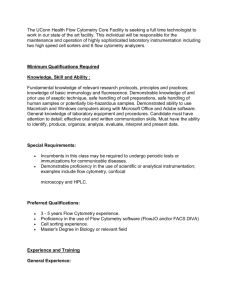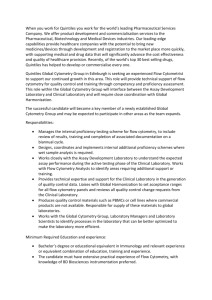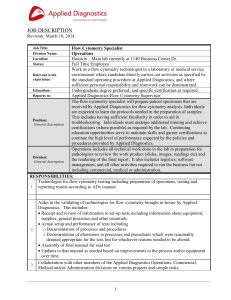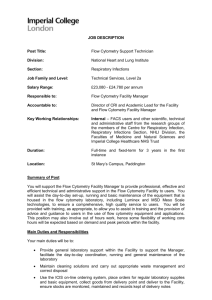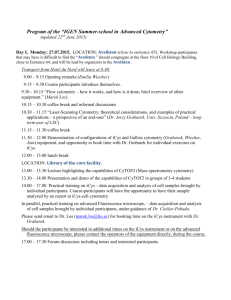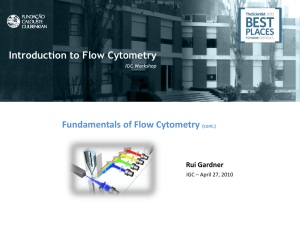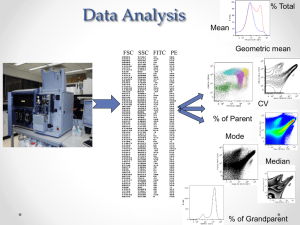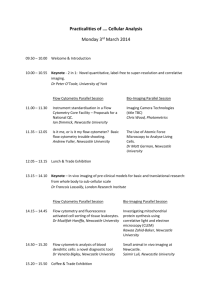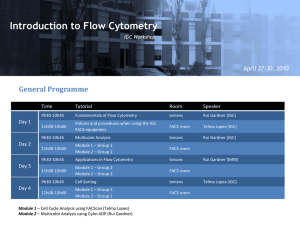Flow Cytometry: Colour Compensation
advertisement
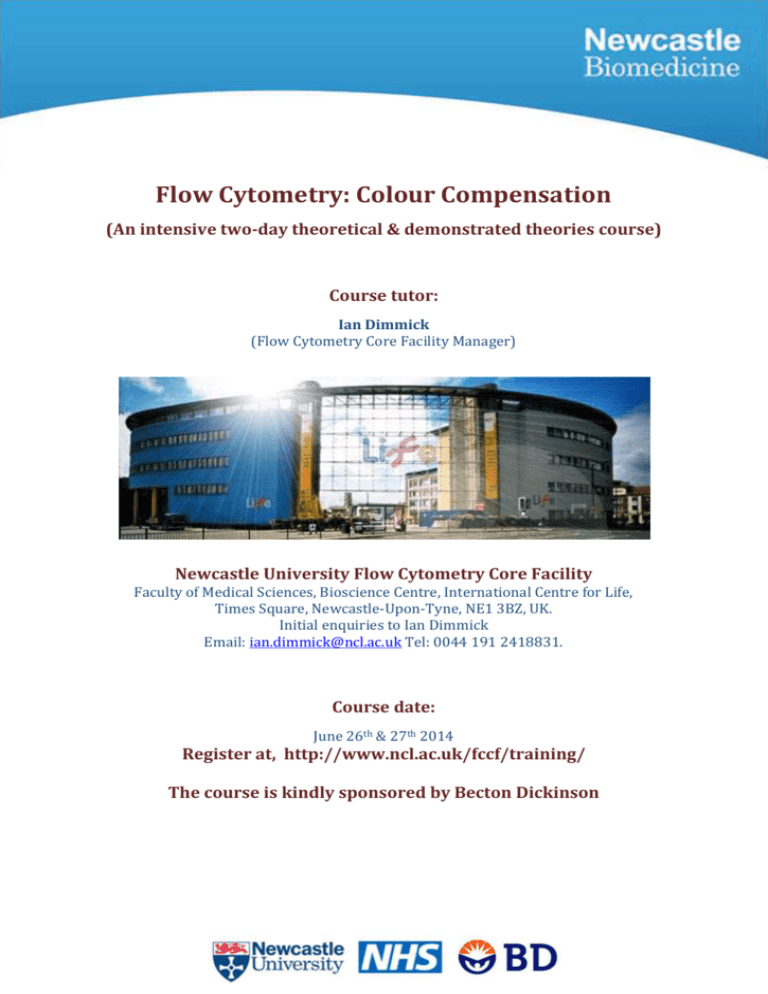
Flow Cytometry: Colour Compensation (An intensive two-day theoretical & demonstrated theories course) Course tutor: Ian Dimmick (Flow Cytometry Core Facility Manager) Newcastle University Flow Cytometry Core Facility Faculty of Medical Sciences, Bioscience Centre, International Centre for Life, Times Square, Newcastle-Upon-Tyne, NE1 3BZ, UK. Initial enquiries to Ian Dimmick Email: ian.dimmick@ncl.ac.uk Tel: 0044 191 2418831. Course date: June 26th & 27th 2014 Register at, http://www.ncl.ac.uk/fccf/training/ The course is kindly sponsored by Becton Dickinson Aim: The purpose of this course is to provide an understanding of the principles, concepts and technology of flow cytometry and the various functions that these technologies can fulfil in a clinical and research setting. Students will begin by getting a thorough theoretical grounding and then move on to supervised hands-on/demonstrated experience of the instruments and experiments, including the setup of both basic and advanced multi-coloured experiments. On completion of this course students will be able to interpret results from a wide range of experiments and variables, comprehend and manipulate the 3 main systems of flow cytometry (optics, electronics and fluidics) and be able to set up and run multicolour experiments on a broad range of flow cytometers with a high degree of confidence and competency. Group numbers are kept low (maximum of 8) to enable individual teaching and supervision, and to encourage discussion and problem solving of specific user applications. Key topics: Instrument set up & quality control of instrumentation. Photodetector voltage settings (cells vs beads). The use of isotype controls and alternate strategies. The use of FMO controls. Instrument configurations. Selecting complimentary fluorochromes and dyes. Identifying spectral overlap and applying compensation. Hardware vs software compensation. Cells and/or beads as compensation controls. Compensation for non antibody based assays (e.g. GFP, viability dyes). The Dos and Don’ts of multicolour compensation. Common problems and solutions. Sample experiments from 2 to 8 colour compensation. Questions. Suggested reading: Hannon Fletcher Perry Maxwell; Advanced Techniques in Diagnostic cellular pathology; ISBN 9780-470-5197-6. Hulspas R, O’Gorman MRG, Wood GL, Gratama JW & Sutherland DR; Considerations for the control of background fluorescence in clinical flow cytometry; Cytometry Part B 2009; 76B: 355 -364. Dimmick I; The use of Qdot® nanocrystals in flow cytometry: Novel reagents expand the scope of multicolour panels. http://www.invitrogen.com/etc/medialib/en/filelibrary/pdf/bioprobes.Par.42700.File.dat/bp54_all.pdf Keeney M, Gratama JW, Chin-Yee IH, Sutherland DR; Isotype Controls in the Analysis of Lymphocytes and CD34+ Stem and Progenitor Cells by Flow Cytometry – Time to Let Go! http://health.usf.edu/NR/rdonlyres/57CB9476-BB36-417D-9ACE6C77F6F6F229/27134/IsotypecontrolsTimetoletgo.pdf Sasaki DT, Maecker H, Trotter J; Establishing Optimum Baseline PMT Gains to Maximise Resolution on BD Biosciences Digital Flow Cytometers. http://www.sickkids.ca/research/FCF/documents/PMToptimization_BD_technote.pdf Course fee and registration: The registration fee for the two-day course is £400 (lunch will be provided). Internal Newcastle University delegates may use grant numbers to pay for the course To register for this course, please e mail Ian Dimmick at ian.dimmick@ncl.ac.uk Or Register via the web link http://www.ncl.ac.uk/fccf/training/ . Directions to venue: The Bioscience Centre is situated at the International Centre for Life, approximately 150m from Newcastle Central Station. Newcastle-Upon-Tyne International Airport is a 15 minute taxi ride, or 30 minutes using the tube. Newcastle University Flow Cytometry Core Facility, Faculty of Medical Sciences, Bioscience Centre, International Centre for Life, Times Square, Newcastle-Upon-Tyne, NE1 3BZ, UK. Recommended accommodation Jury's Inn http://newcastlehotels.jurysinns.com/jurysinn_newcastle The Holiday Inn http://www.ichotelsgroup.com/h/d/ex/1/en/hotel/ncljb?_requestid=757433 The Station Hotel http://www.royalstationhotel.com All are pleasant hotels and within 5 minutes walking distance from both the train station and the Bioscience Centre at the International Centre for Life.
